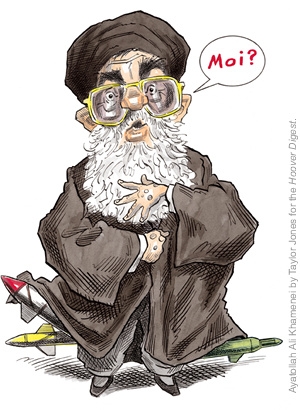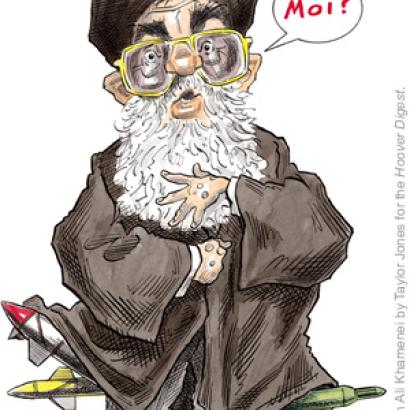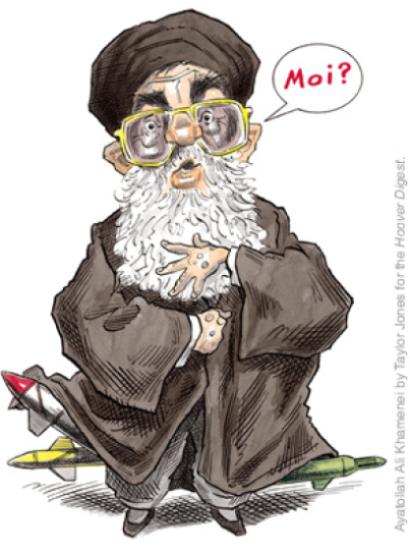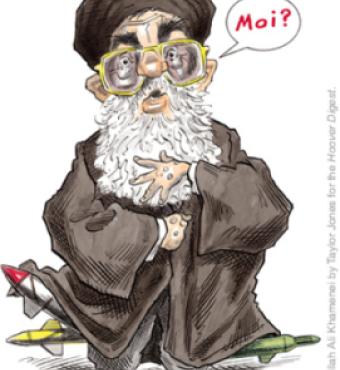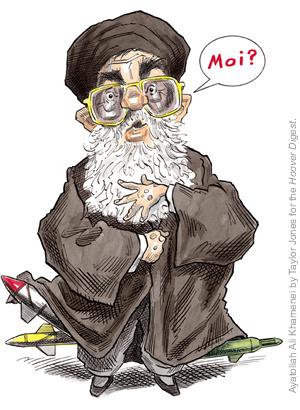- International Affairs
- US Foreign Policy
The United States lacks a coherent policy toward Iran. Until it articulates one, it will be difficult to build an impregnable alliance with Europe (and possibly Russia and Japan) to exert the necessary political pressure on Iran to force it to suspend its nuclear fuel-cycle program. For the past 18 months the Bush administration, because of its preoccupation with Iraq and its internal gridlock, has outsourced the task of confronting Iran on the nuclear issue to the International Atomic Energy Agency (IAEA) and the European Union.
For a period in the summer and fall of 2003, this policy was effective. Iran took seriously the admonishments of the IAEA and the European Union. We can surmise that such cooperation was partly due to the successful U.S. military operation in Iraq in the spring of 2003. But as the war in Iraq has become bogged down and America has come to resemble “a wounded beast” (in the words of former Iranian president Akbar Rafsanjani), Iran’s boldness in dealing with the nuclear issue has grown. This is in parallel to the consolidation of power in the Iranian parliament by the hard-liners and the expectation that they will capture the Iranian presidency in the elections of June 2005. These events, together with a bonanza from high oil prices, have given the hard-liners a long lease on power. Furthermore, the international campaign against Iran’s nuclear program has generated a domestic backlash, with many reformers and moderates sympathizing with the government in its decision to stand up to the United States and the international community.
Yet the dangers of an unrestricted Iranian nuclear program remain unacceptable. The two reasons that Iran remains on President Bush’s “axis of evil” are (1) the regime continues to sponsor terrorists who murder Americans, and (2) it is building a very sophisticated nuclear technology infrastructure. The Bush administration has vowed to take preemptive action against regimes that pose such threats, so Iran’s mullahs must be wondering if they are next in line for the application of U.S. force. The mullahs know that the United States has sufficient military power to reduce most of Iran’s budding nuclear infrastructure to rubble within 48 hours. All international efforts, short of using force, including U.S. economic sanctions, to dissuade Iran from its nuclear course have so far failed.
Absent a fundamental change in the policy of the Iranian regime, especially its support for terrorism, or a change of the regime itself, the prospect of an Iranian bomb is extremely dangerous.
The dangers fall into several categories. Nuclear weapons in the hands of the current regime would be regarded by Iran’s neighbors as a profound threat and would almost certainly stimulate an interest in acquiring nuclear weapons in Turkey, Saudi Arabia, and Egypt. The smaller Gulf Cooperation Council members (Kuwait, Bahrain, Qatar, the United Arab Emirates, and Oman) are likely to call for a more explicit U.S. nuclear guarantee—and they might get it. An Iranian nuclear capability, together with its missile program, will eventually threaten Europe, Russia, and the United States itself. Such a capability would further harm the Nuclear Nonproliferation Treaty (NPT), whether Iran obtains the bomb legally, by withdrawing from the treaty, or illegally, by violating it. Furthermore, the bomb in the hands of the current Iranian regime could embolden it to provide more military and political support to terrorist organizations pledged to destroy the state of Israel. In extremis, it could provide nuclear material to those groups.
In light of all this, it may be satisfying to contemplate the expeditious destruction of Iran’s nuclear facilities—and some Americans do contemplate it. But the use of force should be the very last resort in dealing with the problem of Iran’s would-be bomb.
First, an attack would only delay the regime’s ambition, and third-party countries would likely aid a post-attack Iran such that the delay would not be very significant. Even more important, some senior Iranian officials are not convinced that moving from a nuclear infrastructure to the actual fabrication and deployment of nuclear weapons is in Iran’s national interest. But the more likely a U.S. attack seems, the less influence such doubters are liable to have. A U.S. attack could also be counterproductive politically, in that those opposed to the regime could be harmed by a welling up of Iranian nationalist fury.
Second, the broader political price the United States would pay for attacking Iran would be considerable, unless Iran were in clear breach of its legal commitments to existing nonproliferation agreements.
There may also be an upside to U.S. restraint. If the present regime can be persuaded to abandon terrorism and to enter into a political dialogue with the United States, the calculus of risks and incentives in Iran’s contemplation of deploying nuclear weapons can perhaps be influenced for the better. Such an Iran could make possible the reconsideration of a regional security regime for the greater Middle East that could enfold the growing dangers of chemical and biological weapons proliferation as well as nuclear proliferation. If there is parallel progress on resolving the Palestinian-Israeli issue, a new dialogue on the sensitive subject of Israel’s nuclear weapons might be possible.
The Need for a Multilateral Approach
To stop, or significantly slow down, Iran’s push for a bomb will require a multilateral, multitiered effort, headed by the United States. It would have to involve tempting carrots and threatening sticks, as well as continued cooperation with Europe, Russia, and China. It will, of course, also require a fundamental change in Iran’s bilateral relations with the United States. However difficult both parts of this effort may be, it is worth pursuing. Otherwise, the only options available are to hope for quick regime change in Tehran (with all its uncertainties) or to decide to use force (with all its dangers and costs).
The first step for the Bush administration is to come up with a coherent strategy that is acceptable to the Europeans. Major disagreements have emerged over the years between Washington and Brussels on how to deal with the Islamic Republic of Iran. The European Union has favored engagement with the regime as the best way to persuade it to change its policies, but the Clinton and Bush administrations have generally favored a combination of unilateral economic sanctions and public criticism.
Europe’s concerns about Iranian nuclear activity have grown more serious in recent months, and the three key players—Britain, France, and Germany—now share U.S. intelligence estimates that point clearly to Iran’s development of a nuclear bomb. Europe and the United States have common strategic interests in curbing the Iranian bomb. Both understand that a nuclear Iran would radically alter the strategic balance in the Middle East and could, under some circumstances, trigger a major military confrontation, which would be disastrous for all concerned. It is therefore essential that there be a common policy between Washington and Brussels on dealing with the problem.
A Grand Bargain?
Perhaps the only circumstance under which Iran might abandon, suspend, or put under international control its nuclear fuel cycle would be as part of a far-reaching agreement with the United States, which would include lifting U.S. sanctions and American cooperation in developing Iran’s energy resources and pipeline infrastructure. (One key impact of U.S. sanctions has been to deter other major countries, such as Japan and many European nations, from investing in Iran’s energy sector out of fears of retaliation from Washington.) Such an agreement would also have to end Iran’s support for anti-Israel terrorism. In turn, American leaders would have to refrain from statements questioning the legitimacy of the Islamic Republic and end all discussion of regime change.
Consider the example of Libya, which dramatically disavowed terrorism and abandoned its weapons of mass destruction (WMD) program in 2003. Talk about the Libyan regime no longer emanates from Washington. The deal with Libya probably would have been impossible had London not reestablished diplomatic relations with Tripoli and thus been in a position to make the first overtures to Muammar Qaddafi, which then paved the way for American involvement. The parallel would be the European Union, which maintains close diplomatic ties with Iran and is in a better position than the United States to initiate any kind of deal. The obvious lesson for the United States is that, if one has a party that can engage with proliferating states, it is easier to broker deals.
In the end, the dangers of an Iranian bomb cannot be decoupled from Iranian support for terrorism. If Iran were to walk away from the terrorism business and cooperate with the United States in Iraq and Afghanistan, then the nuclear crisis would immediately be more manageable and less likely to provoke an international standoff with the concomitant threat of military force.
For a number of years the phrase “grand bargain” has been bandied about by Iran watchers to refer to a far-reaching political deal that would resolve the major points of contention between the United States and Iran and lead to an improvement in relations. The phrase has attracted considerable attention, in part because no one is sure what it really means. Furthermore, to those who regard engagement with the Islamic regime as anathema, the phrase has become indicative of an appeasement mentality that proposes to do business with the devil at the expense of the freedom-seeking people of Iran.
For the record, it is not unusual for democratic states to negotiate far-reaching agreements with totalitarian and autocratic regimes. In the case of the Soviet Union and communist China, successive U.S. leaders argued that American strategic interests were served by having stable relations with these two regimes, despite their appalling records on human rights, their lack of transparency, and other matters of concern to the West. Stable relations did not require accepting either their values or their behavior, but it did mean accepting certain codes of conduct that precluded direct interference in their political systems. It did not preclude espionage or assertive public diplomacy condemning their political practices. It meant continuing sanctions on sensitive exports and limits on their access to Western markets. It did not preclude continued competition for the hearts and minds of neutral countries.
To apply these precedents to Iran is neither unrealistic nor amoral. It would require that the United States and Iran reach agreement on several red-button issues that both sides consider critical to their national interests. For the United States, it would mean verifiable proof that Iran was not engaged in a nuclear weapons program, that it was committed to the Chemical Weapons Convention, that its military and financial support for anti-Israel terrorist groups had ended, and that it was prepared to accept an Arab-Israeli peace settlement.
Since several of the key U.S. red buttons are also shared by the European Union, forging a common U.S.-E.U. policy on a negotiating strategy has considerable appeal. Indeed, one way to look at the elements of a grand bargain is to consider the European Union’s decision in 2002 to enter into negotiations with Iran for a trade and cooperation agreement and how this has evolved into a template for E.U.-Iranian relations. The European Union has declared that trade discussions with Iran are inextricably linked to progress on four important non-trade items: the Arab-Israeli conflict, human rights, terrorism, and WMD. European Union officials have assured their American counterparts that the political agenda linkage is critical to the overall package.
If Europe’s conditions are sustained and Iran is willing to accept them, then much of the U.S. agenda would also seemingly be covered. The uncertainty concerns the precise definition of the E.U. benchmarks and how rigorously they will be implemented. Concerning WMD, the European Union and the United States have sustained a common approach to the nuclear issue over the past several months, but the final agenda is not yet resolved, especially concerning Iran’s determination to build a fuel cycle. And there are uncertainties over other WMD benchmarks, such as Iran’s transparency to the Chemical Weapons Convention and its surface-to-surface ballistic missile program. The same ambiguity applies to benchmarks on human rights, terrorism, and Arab-Israeli negotiations. If the United States and the European Union could agree to tough, common positions and procedures on these complicated questions, then they would have formidable leverage over Iran.
Iran would only consider the benchmarks if the other side of the equation—the carrot—was outlined with similar precision. Iran would thus expect a clear pledge of no direct interference in its domestic affairs; an acceptance of the legitimacy of the Islamic Republic; the removal of U.S. sanctions except those on military technology; a settlement of all outstanding asset claims and an end to obstructions in all international forums restricting Iran’s ability to borrow at concessional rates; access to Europe’s gas markets; and more Western investment in its energy sector. Iran would also have a right to be included in a discussion about regional security arrangements involving the United States, NATO, and other organizations.
In the real world of compromise and adjustments, such a grand bargain would indeed be worthy of the name. Eventually, Iran’s political system will change for the better, but it will come from decisions Iranians make themselves and are prepared to struggle for. We should praise their struggle but, in the meantime, be willing to work with the current regime for the mutual interests of all parties. If this is seen by some as appeasement or a sellout, so be it. Stopping the bomb and terrorism are our priorities, and if we can make practical deals with dictators such as Muammar Qaddafi and Pervez Musharraf, we can do a deal with Tehran—provided that Tehran lives up to its part of the bargain. If it does not, then we will have to prepare for more serious confrontation, but trying to reach an agreement is essential if we are to have any hope of dealing with Iran in cooperation with our European allies.
